Sport is a unifying commodity, capable of resonating with millions of people around the world.
Hockey is no exception.
Each season is full of emotional moments that have fans teary-eyed. Most recently, Laila Anderson’s inspiring journey alongside the St. Louis Blues captured the hearts of hockey fans across the globe.
While certain moments pull on the heartstrings, incredible displays of perseverance also inspire many around the NHL. The Bill Masterton Memorial Trophy is awarded each season to the player who best exemplifies perseverance, sportsmanship, and dedication to hockey. This past season, goaltender Robin Lehner won the award. He had a career year during the 2018-19 season after seeking help for his bipolar disorder and substance abuse problems in the previous offseason.
Those two examples aside, this piece will go over a collection of the most inspiring stories in NHL history. Obviously, throughout the NHL’s decorated past, there are hundreds of moments that can be covered. If I happened to miss your favorite moment, please let me know in the comments below.
Mario Lemieux’s Triumphant Return
When scouring the hockey landscape for stories about perseverance, Mario Lemieux’s 1992-93 season stands at the forefront of the sport. The Pittsburgh Penguins were a powerhouse at the start of the 1990s, capturing back-to-back Stanley Cups in 1991 and 1992.
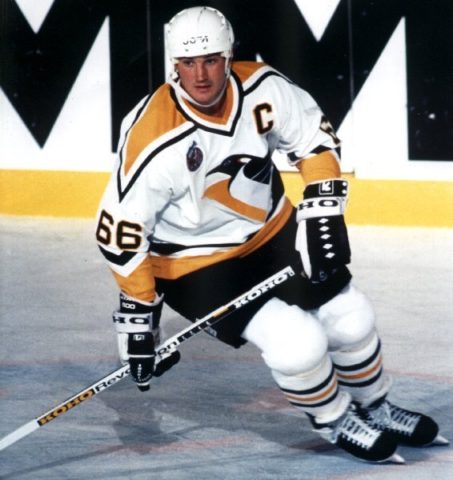
Lemieux spearheaded a daunting attack that included Jaromir Jagr, Ron Francis, Larry Murphy, Paul Coffey, Kevin Stevens, and Rick Tocchet. With the team looking to win their third-straight Stanley Cup, they owned a league-best 28-10-4 record halfway through the season. Lemieux was in fine form, posting 104 points in his first 40 games, and the Penguins seemed unstoppable.
Unfortunately, everything changed in January, as Lemieux developed Hodgkin’s disease. He had to undergo radiation treatment to combat the illness, which cost him nearly two months of the season. While the Penguins managed to stay afloat without their captain, New York Islanders’ star Pat Lafontaine surged ahead of Lemieux in the scoring race.
After his final day of radiation treatment on March 2, he returned to the team and scored a goal and assist in his first game back. While that alone is impressive, Lemieux did not stop there. Over the Penguins’ final 20 games, he scored an unbelievable 56 points, which gave him 160 points in just 60 games. For perspective, the second-highest point total by a player limited to 60 games in a season was the 81 points produced by Joe Sakic in 1999-00.
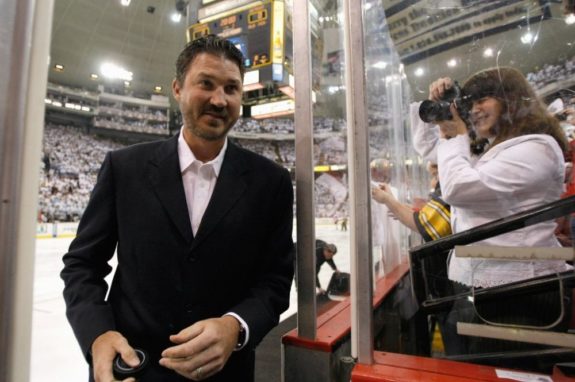
With just 18 games left in the regular season, Lemieux led the Penguins on an NHL record 17-game win streak. Lemieux ultimately won the Art Ross Trophy as he beat out Lafontaine by 12 points. Furthermore, he captured the Hart, Lester B. Pearson, and Masterton Trophies as well for his incredible endeavor. His 2.66 points per game rating is the third-highest total of all time, and his 224-point pace would have shattered Wayne Gretzky’s record of 215 points in a season.
Related: 10 Most Impressive Streaks In NHL History
The Penguins ultimately fell short of their third straight Stanley Cup, but Lemieux’s relentless determination inspired hockey fans across the globe. His 1992-93 season may be the most impressive, and inspiring, campaign the league has ever seen.
Craig Anderson’s Emotional Shutout
Since joining the Ottawa Senators in the 2010-11 season, Craig Anderson has become the winningest goaltender in franchise history with 191 victories. He has had many memorable moments throughout his nine seasons with the team, but on Oct. 30, 2016, he showcased why hockey is more than a game.
Earlier in the week, Anderson was granted a leave of absence from the team as his wife Nicholle received a throat cancer diagnosis. Despite having the heaviest of hearts, Anderson’s wife urged him to return to the sport that he loved. After caring for her for a few days, he rejoined the team for a matchup with the red-hot Edmonton Oilers.
The Oilers were on a five-game win streak, but Anderson was undeterred. He made 37 saves in a 2-0 victory, earning the first star of the game honors.
Following the game, opposing netminder Cam Talbot said, “Him being able to play the way he did, under those circumstances, you have to give him so much credit.”
Anderson went on to post a 25-11-4 record that season with a 2.28 goals-against average. He led the Senators on a remarkable playoff run, finally ending in Game 7 of the Eastern Conference Final. He won the Bill Masterson Trophy, but the best reward was coming a few months later. After battling the disease for seven months and doing 33 sessions of radiation, Nicholle Anderson was deemed cancer-free in May 2017.
Bobby Baun’s Broken Leg Winner
Bob Baun was not a flashy defenseman. He played 17 years in the NHL, and he never managed to produce over 21 points in a season. Instead, Baun relied on steady defensive play and physicality to carve out his decorated career.
In the 1964 Stanley Cup Final, the visiting Toronto Maple Leafs were down 3-2 in the series to the Detroit Red Wings. Game 6 was tied 3-3 in the third period when Baun was drilled in the foot by a Gordie Howe wrist shot. He was hobbled and had to go to the dressing room to be examined by the team doctors.
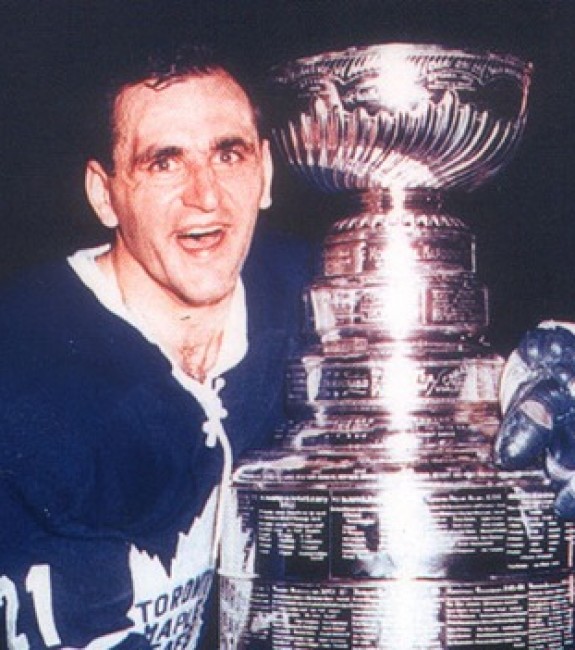
Upon arriving, Baun asked, “Can I hurt myself even more?” (from ’50 years later, Maple Leafs legend Bobby Baun still unstoppable,’ The Star, 04/11/2014). The doctors said no, froze and taped his leg, and sent him back out for the overtime session. Despite only scoring 37 goals in his 964-game career, Baun fired a wobbling puck past Red Wings’ goaltender Terry Sawchuck to send the series to Game 7.
Inspired by the heroics of their rugged defenseman, the Maple Leafs cruised to a 4-0 victory in Game 7 to capture their third straight Stanley Cup. After the ensuing celebration, Baun found out he had a hairline fracture in his ankle. He produced one of the more iconic moments in Maple Leafs’ history on a broken leg. Had he not persevered through the pain and willed his teammates to victory, the season could have ended very differently.
Brian Boyle’s Hockey Fights Cancer Hat Trick
Much like Baun, Brian Boyle is an unlikely source of offense. While he has some flair around the net, his menacing frame and relentless forechecking are the calling cards to his game. On Nov. 5, 2018, Boyle tallied the first hat-trick of his NHL career during a 5-1 win over the Pittsburgh Penguins. While that is a worthy accomplishment, it becomes a heartwarming moment of inspiration with the context of the night.
Nov. 5 was ‘Hockey Fights Cancer’ night in Pittsburgh, which held a special place in Boyle’s heart. A bone marrow cancer diagnosis rocked Boyle’s world before the previous season. Despite going through treatment, he managed to play in 69 games that season and help lead the Devils to a surprising playoff berth. His display of perseverance earned him a berth in the All-Star Game, the Masterton Trophy, and the admiration of many around the hockey world.
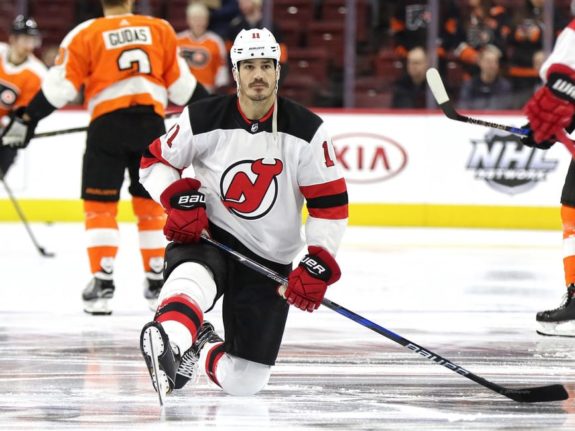
Another uplifting wrinkle to the story is that Boyle’s cancer went into remission two weeks before the game against the Penguins. The 34-year-old proved he was also a warrior off of the ice by battling cancer head-on. While he has had many notable moments throughout his lengthy career, his unlikely hat trick is unquestionably the nearest to his heart.
Paul Kariya’s Iconic Tally
There may be no better example of a willingness to win than Paul Kariya’s goal in the 2003 Stanley Cup Final. During Game 6, with his team down 3-2 in the series, Kariya was decimated by New Jersey Devils’ defenseman Scott Stevens. It was an egregious, predatory hit that was the trademark of Stevens’ game, but dirty play was not as defamed as it is now.
Kariya, one of the league’s brightest stars, lay unconscious on the ice as time slowed to a crawl. A full 48 seconds passed before he finally took a deep breath that clouded his visor with fog. He left the ice with the help of his teammates, and he headed to the dressing room. Safety regulations were far more relaxed in the early 2000s, as Kariya was allowed to return to the game a few minutes later.
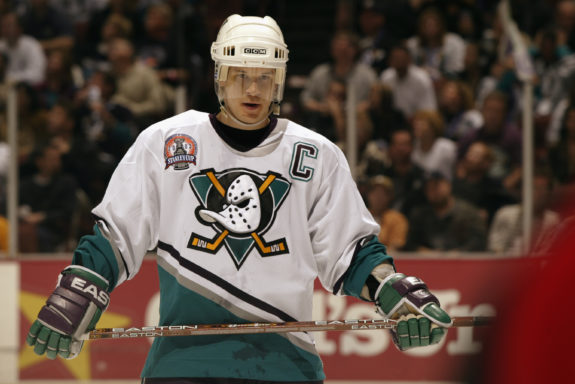
Just the fact that the Ducks’ captain returned after such a devastating hit inspired his teammates. On his very next shift, Kariya fired a blistering slapshot past Devils’ goaltender Martin Brodeur as the Ducks went on to win the game 5-2. It was one of the more thrilling goals, and goal calls, in Stanley Cup Final history.
The Ducks ultimately lost in Game 7, but Kariya’s legendary moment became etched into NHL lore. The Hall-of-Famer lost his love for hockey after suffering through several harrowing concussions. Nevertheless, hockey fans have never lost their love for one of the toughest players in league history.
Martin St. Louis’ Mother’s Day Goal
Throughout his Hall-of-Fame career, Martin St. Louis gave hockey viewers an encyclopedia of timeless moments. He scored a massive overtime goal in Game 6 of the 2004 Stanley Cup Final, won two Art Ross Trophies, and electrified the league on a nightly basis.
The diminutive forward joined the New York Rangers midway through the 2013-14 season as the team was intent on making a deep playoff run. They matched up with the potent Pittsburgh Penguins in the second round and found themselves down 3-1 in the series after four games.
Related: Martin St Louis, the Little Big Man
Shockingly, in the days leading up to the next game, St. Louis received the news that his mother had unexpectedly died at the age of 63 due to a heart attack. He rushed back to Montreal to be with his family but returned 24 hours later intent on playing in Game 5. He told Rangers’ head coach Alain Vigneault that his mother would want him out on the ice with his teammates.
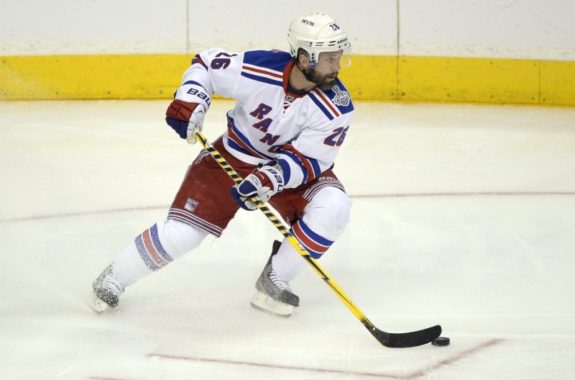
While St. Louis did not score in the game, the Rangers came out with heavy hearts and blasted the Penguins 5-1. After the contest, St. Louis told reporters, “She was a great lady, the best human being I’ve ever known in my life. . . . I know she would have wanted me to play.” (from ‘New York Rangers end power-play drought, top Pittsburgh Penguins to extend series,’ National Post, 05/09/2014)
As fate would have it, Game 6 was on Mother’s Day. St. Louis had his father and sister come to New York, and with them in the crowd, he opened the scoring early in the first period. His passionate celebration galvanized the team, as they won the game 3-1. St. Louis gave a heartfelt post-game speech following the contest, and the Rangers rode the emotional tidal wave to a 2-1 win in Game 7.
While the Broadway Blueshirts ultimately lost in the Cup Final that season, St. Louis endeared himself to New York and the rest of the sporting landscape. His selfless display of perseverance and inspiration is a hockey memory that will last forever.
Red Wings Win One For Vladdy
The Detroit Red Wings were a fantastic franchise in the late 1990s. After getting humiliated in the 1995 Stanley Cup Finals and reaching the 1996 Western Conference Final, they finally broke through with a Stanley Cup victory in the 1996-97 season.
Steve Yzerman, Sergei Fedorov, and Brendan Shanahan led the attack while Nicklas Lidstrom, Viacheslav Fetisov, and Norris Trophy finalist Vladimir Konstantinov patrolled the blueline. The Red Wings had a deep roster, and they were primed to repeat as champions.
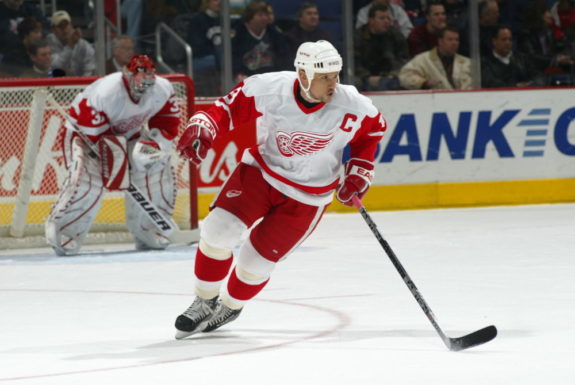
The team had not won a Stanley Cup in 42 years before the victory, and they were celebrating their crowning achievement with unbridled exuberance. It was arguably the most substantial moment in Detroit’s sports history, but tragedy ended the celebration far too quickly. On June 13, 1997, a limo carrying Fetisov, Konstantinov, and team masseuse Sergei Mnatsakanov struck a tree at high speed.
Fetisov suffered broken ribs and a punctured lung, but he was able to continue playing hockey. Mnatsakanov was permanently paralyzed from the waist down, and Konstantinov entered a coma that spanned several weeks. Once awake, the star defenseman never regained full physical or mental capabilities. His playing career was over, just six days after being on top of the hockey world.
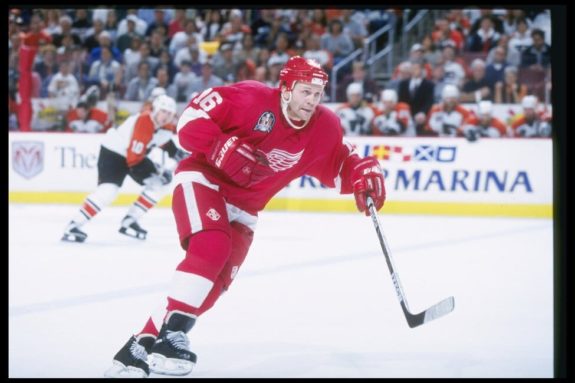
A summer of celebration quickly turned to one of mourning for the Red Wings. Not only had they lost one of the best defensemen in the league, but two of their close friends experienced life-changing injuries. The team dedicated the 1997-98 season to Mnatsakanov and Konstantinov, showcased by a patch on their jerseys that honored the pair. The team had a strong regular season, finishing third in the league, and they only lost six games in the playoffs en route to the Stanley Cup Final.
They faced the Washington Capitals in the championship series and swept them convincingly. After Game 4, Yzerman received the Cup from league commissioner Gary Bettman. He immediately passed it off to Konstantinov, who was celebrating on the ice in his wheelchair. The entire team mobbed their former colleague, and Shanahan wheeled Konstantinov around the ice while he held the Cup.
It was an everlasting moment in league history and proved that heroism could be born out of heartbreak. While Konstantinov was unable to play with his teammates on the ice, he undoubtedly inspired them to victory off of it.
Final Word
Countless examples could go on a list like this, so do not be discouraged if your favorite inspirational moment was not featured. Instead, comment down below or reach me on Twitter @MondoHarrison and let me know the moments that resonated with you. I am always happy to chat about hockey!